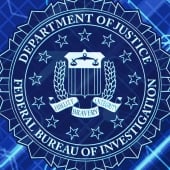-
FBI adds Russian cybercrime market owner to most wanted list
A Russian national has been indicted by the US DOJ and added to the FBI's Cyber Most Wanted list for allegedly creating and managing a cybercrime marketplace.
- March 23, 2022
- 07:05 PM
 2
2
-
FBI: Ransomware hit 649 critical infrastructure orgs in 2021
The Federal Bureau of Investigation (FBI) says ransomware gangs have breached the networks of at least 649 organizations from multiple US critical infrastructure sectors last year, according to the Internet Crime Complaint Center (IC3) 2021 Internet Crime Report.
- March 23, 2022
- 03:00 PM
 0
0
-
BIG sabotage: Famous npm package deletes files to protest Ukraine war
This week, the developer of the popular npm package 'node-ipc' released sabotaged versions of the library in protest of the ongoing Russo-Ukrainian War. The 'node-ipc' package, which gets downloaded over a million times weekly, began deleting files on developer's machines, in addition to creating new text files with "peace" messages.
- March 17, 2022
- 05:51 AM
 12
12
-
2022 may be the year cybercrime returns its focus to consumers
Threat analysts expect 2022 to be the tipping point for a shift in the focus of hackers from large companies back to consumers.
- February 27, 2022
- 10:11 AM
 0
0
-
Telegram is a hotspot for the sale of stolen financial accounts
Telegram is increasingly abused by cybercriminals to set up underground channels to sell stolen financial details to pseudonymous users.
- January 18, 2022
- 04:39 PM
 0
0
-
Europol shuts down VPN service used by ransomware groups
Law enforcement authorities from 10 countries took down VPNLab.net, a VPN service provider used by ransomware operators and malware actors.
- January 18, 2022
- 06:55 AM
 0
0
-
Bulletproof hosting founder imprisoned for helping cybercrime gangs
34-year-old Russian Aleksandr Grichishkin, the founder of a bulletproof hosting service, was sentenced to 60 months in prison for allowing cybercrime gangs to use the platform in attacks targeting US financial institutions between 2008 to 2015.
- December 01, 2021
- 04:23 PM
 0
0
-
These are the cryptomixers hackers use to clean their ransoms
Cryptomixers have always been at the epicenter of cybercrime activity, allowing hackers to "clean" cryptocurrency stolen from victims and making it hard for law enforcement to track them.
- November 16, 2021
- 12:01 PM
 0
0
-
Cybercrime matures as hackers are forced to work smarter
An analysis of 500 hacking incidents across a wide range of industries has revealed trends that characterize a maturity in the way hacking groups operate today.
- October 21, 2021
- 10:58 AM
 0
0
-
Bulletproof hosting admins sentenced for helping cybercrime gangs
Two Eastern European men were sentenced to prison on Racketeer Influenced Corrupt Organization (RICO) charges for bulletproof hosting services used by multiple cybercrime operations to target US organizations.
- October 21, 2021
- 07:52 AM
 0
0
-
Russia and China left out of global anti-ransomware meetings
The White House National Security Council facilitates virtual meetings this week with senior officials and ministers from more than 30 countries in a virtual international counter-ransomware event to rally allies in the fight against the ransomware threat.
- October 13, 2021
- 06:56 AM
 0
0
-
Bitcoin.org hackers steal $17,000 in 'double your cash' scam
This week, threat actors hijacked Bitcoin.org, the authentic website of the Bitcoin project, and altered parts of the website to push a cryptocurrency giveaway scam that unfortunately some users fell for. Although the hack lasted for less than a day, hackers seem to have walked away with a little over $17,000.
- September 25, 2021
- 10:00 AM
 2
2
-
RaidForums data marketplace accidentally exposes private staff page
Underground marketplace and hacker forum, Raidforums, recently exposed internal pages from its website, meant for staff members only. Raidforums is a data breach marketplace where threat actors often sell or leak illicitly obtained data dumps.
- September 22, 2021
- 08:05 AM
 1
1
-
Europol links Italian Mafia to million-dollar phishing scheme
In collaboration with Europol and Eurojust, European law enforcement dismantled an extensive network of cybercriminals linked to the Italian Mafia that was able to defraud their victims of roughly €10 million ($11.7 million) last year alone.
- September 20, 2021
- 08:41 AM
 0
0
-
Ransomware gang threatens to leak data if victim contacts FBI, police
The Ragnar Locker ransomware group is warning that they will leak stolen data from victims that contact law enforcement authorities, like the FBI. Ragnar Locker has previously hit prominent companies with ransomware attacks, demanding millions of dollars in ransom payments.
- September 07, 2021
- 02:28 AM
 0
0
-
FIN8 cybercrime gang backdoors US orgs with new Sardonic malware
A financially motivated cybercrime gang has breached and backdoored the network of a US financial organization with a new malware known dubbed Sardonic by Bitdefender researchers who first spotted it.
- August 25, 2021
- 09:00 AM
 0
0
-
Hackers behind Iranian wiper attacks linked to Syrian breaches
Destructive attacks that targeted Iran's transport ministry and national train system were coordinated by a threat actor dubbed Indra who previously deployed wiper malware on the networks of multiple Syrian organizations.
- August 16, 2021
- 09:06 AM
 0
0
-
Sponsored Content
Email fatigue among users opens doors for cybercriminals
When it comes to email security, a one-and-done approach never works. Using this multi-layered approach, which includes URL filtering, can often block malicious domains and downloads of malware, preventing systems from being infected in the first place.
- July 07, 2021
- 09:05 AM
 0
0
-
G7 leaders ask Russia to hunt down ransomware gangs within its borders
G7 (Group of 7) leaders have asked Russia to urgently disrupt ransomware gangs believed to be operating within its borders, following a stream of attacks targeting organizations from critical sectors worldwide.
- June 14, 2021
- 03:47 PM
 2
2
-
Interpol shuts down thousands of fake online pharmacies
The Interpol (International Criminal Police Organisation) has taken down thousands of online marketplaces that posed as pharmacies and pushed dangerous fake and illicit drugs and medicine.
- June 13, 2021
- 10:27 AM
 0
0

























